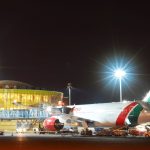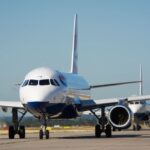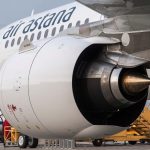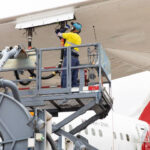UK-based low-cost carrier Jet2.com has announced the introduction of “one of the largest airline carbon offset schemes globally” to compensate for those of its emissions not already covered by regulatory emission trading systems operated by the EU and UK, and ICAO’s CORSIA offsetting scheme. The holiday airline, the UK’s third biggest, has also committed to ensuring that those free allowances it receives under the EU and UK ETS will be covered through the purchase of carbon offsets. It will also offset emissions on routes that are exempted from ETS coverage, like the Canary Islands and the Azores, and all emissions – not just those above the 2019 baseline – on flights that fall within CORSIA, such as to Turkey. Jet2, which includes Jet2.com and Jet2holidays, launched a sustainability strategy last September to set the company on a path to net zero emissions by 2050, in line with UK government policy, but now says it is planning to achieve the goal earlier and is aiming to start using UK-produced sustainable aviation fuel by no later than 2026, reports Tony Harrington.
According to the airline’s website, total CO2e emissions for the financial year ended 31 March 2021 from the business were 315,378 tonnes, with 314,097 tonnes coming from aircraft operations. With the impact of the Covid-19 pandemic, this was an 86% reduction on the previous year when emissions from aircraft operations totalled 2,275,000 tonnes.
“What we have committed to do is ensure that we will pay for every tonne of CO2,” Daniel Walker, General Manager Sustainability for Jet2.com and Jet2holidays, told GreenAir. “Based on figures for the financial year 2019/2020, this would amount to offsetting over 50% of our emissions, with the remaining emissions covered in the EU and UK ETS. It is therefore a big commitment and we believe one of the largest offsetting schemes of any airline in the world.”
As of 1 January 2022, Jet2’s ground operations are carbon neutral, which it claims makes it one of the first European airlines to achieve this, with all Jet2 and Jet2holiday offices now carbon neutral and powered by renewable energy. It intends increasing deployment of zero-emission ground service equipment, which is expected to comprise 50% of vehicles by 2023.
Walker added the company would be publishing details of its offsetting programme, along with other sustainability initiatives, in its annual reports.
The company is against passenger voluntary offsetting. “We know that carbon offsetting programmes based on customer choice are not the future of sustainable travel,” it says in its sustainability strategy report. “Despite many airlines offering customers the ability to offset their flights, data suggests that customer offsets achieve less than 1% uptake across the airline industry. That is why we have made carbon offsetting an intrinsic part of our business strategy. It means our customers don’t need to think about carbon offsetting because we’ve got their carbon covered.”
The airline uses a fleet of 90 aircraft to fly more than 450 routes between 10 destinations in the UK and over 70 in Europe. Prior to the pandemic, Jet2’s emissions per passenger kilometre of 67.0g “put us amongst the most efficient airlines in the world,” said the airline, and in the period from 2011 to 2020 it improved efficiency by more than 19%, averaging 2.4% a year – substantially ahead of ICAO’s global annual average efficiency goal of 2%. It was consequently ranked 11th in the list of the world’s most fuel-efficient airlines in atmosfair’s most recently published Airline 2018 Index. In common with most airlines, the unprecedented operational and financial challenges of the pandemic has had an adverse impact on efficiency, with gCO2 per passenger-km increasing to 89.8g.
However, by 2030, Jet2 wants to reduce its CO2 emissions by 10% per passenger through initiatives including the introduction of new, more efficient aircraft. Prior to announcing its broad-based sustainability strategy last year, the finer details of which are to be released during this year, Jet2 had already invested heavily in a low-emission future, with a decision to purchase up to 75 Airbus A321neo aircraft at a list price of $10.1 billion.
As well, through a range of operational initiatives, the airline said it cut carbon emissions last financial year by 2,600 tonnes. These avoidance measures included single engine taxiing, reduced thrust take-offs, performance-based navigation approaches, continuous descents, the use of pre-conditioned air, weight reduction through the use of lighter seats, catering carts and carbon brakes, and, where available, fixed electrical ground power and electric ramp vehicles.
Beyond carbon reductions, the airline is targeting an 80% reduction in single use plastics on its aircraft through the use of other items including wooden cutlery and cardboard meal boxes, and recycling of products including water bottles, knives, forks, spoons and wooden stirrers. It said this would equate to the removal of 11 million items based on 2019 usage.
The airline believes sustainable aviation fuel “is the medium-term solution for the sector” to reduce carbon and is aiming to start using SAF by no later than 2026. Walker revealed Jet2 has already agreed a letter of intent with an unnamed SAF provider and was currently working on time scales for SAF delivery in the UK.
“This action, alongside our offsetting scheme and the purchase of new A321neos, signifies our commitment to lowering emissions wherever possible,” he said.
Added Steve Heapy, CEO of Jet2.com and Jet2holidays: “This year, we will continue to make strides to develop our commitment to SAF, as well as our hotel sustainability charter, so that we are becoming more sustainable in the air, on the ground and in the resort.
“We will also be calling on governments at home and in Europe to match the increased regulation on aviation by taking their own actions to decarbonise the sector. This includes investing the proceeds of the UK and EU ETS schemes, as well as any other green levies imposed on the aviation industry, directly into decarbonisation and reporting on where these proceeds are being invested. We will continue pushing for airspace reforms across Europe, which will dramatically and immediately reduce carbon emissions in EU airspace by at least 10%.”
Additional reporting by Christopher Surgenor
Photo: Jet2.com














More News & Features
African Development Bank and Japanese industrialist unite to explore SAF production in Africa
LanzaJet and KMG agree to progress SAF production project in Kazakhstan
SkyNRG says e-SAF and carbon removals should not be competing strategies for aviation decarbonisation
South Korea announces mandatory SAF blending for departing international flights from 2027
Catagen launches SAF production company and signs offtakes with Ryanair and Shell
Australia announces A$1.1bn incentive scheme to drive local production of low carbon fuels including SAF